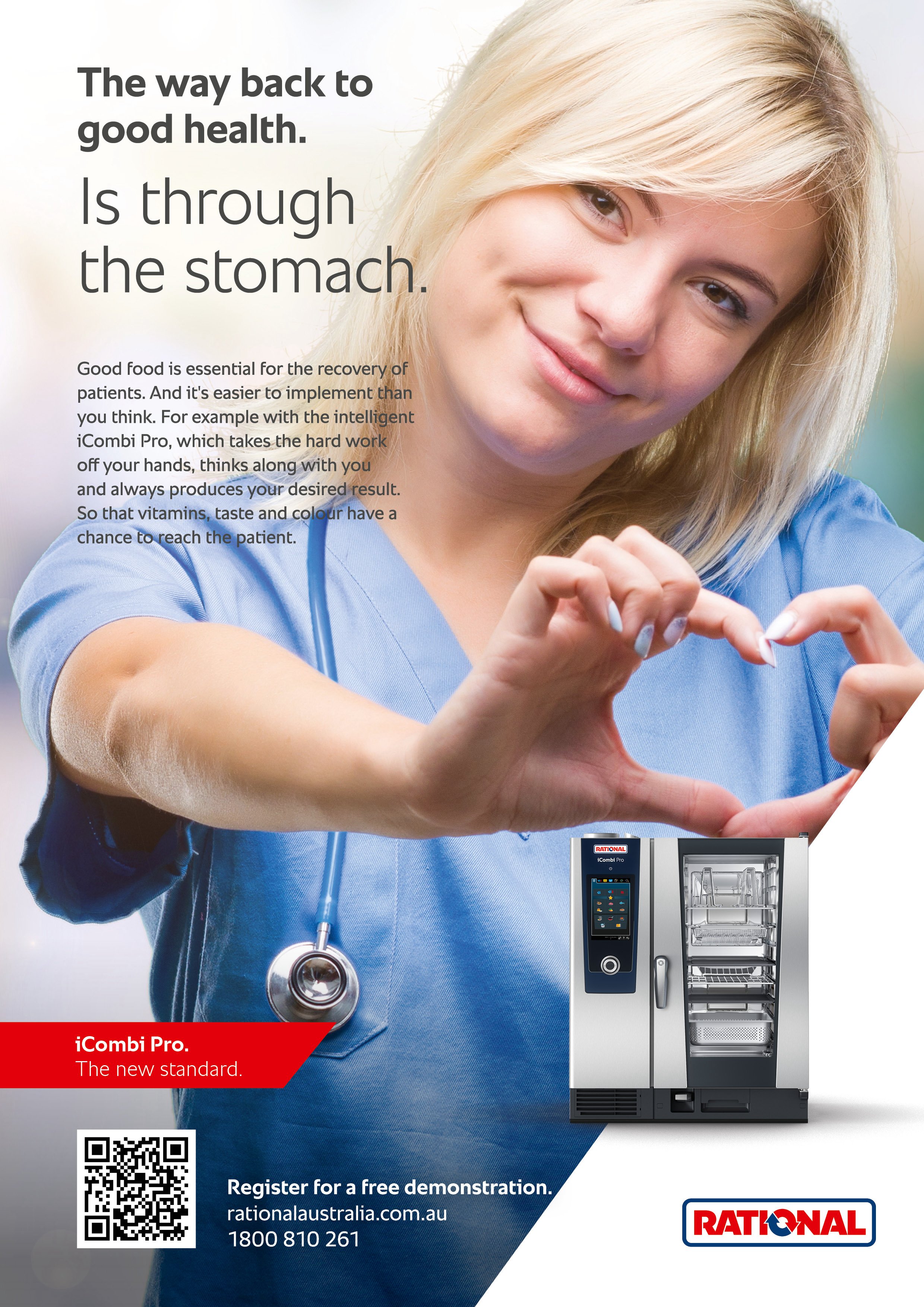
Innovative service delivery model at hospital mental health unit provides inpatients with more autonomy
Patients in the new mental health inpatient unit at Queensland’s Hervey Bay Hospital – part of Wide Bay Hospital and Health Service – are reaping the benefits of an innovative food service model. We spoke to food services manager Stanley Pennant to find out what it involves and how it came about.
“The impetus for the model was the design and fitout of the kitchen for the mental health unit, which was initially designed as a satellite retherm kitchen – an adjunct to the kitchen in the main part of the hospital,” Stanley explains.
“It was designed in consultation with Donald Christie who was food services manager before me, and he did a great job in putting in all the bells and whistles you would expect from a kitchen of its size. When I came into the role, after having worked in other positions at Wide Bay, it was at the point where we were discussing service delivery and looking at menus. Having worked in food trucks in the past, I know that you can do a lot in a limited space – so I could see the potential with this kitchen to adapt the service model into something more innovative than had been planned initially.”
“Once we started planning it became apparent that we could move to what I call a modular or flexible on demand menu, which allows patients to mix and match and so build their own meal choices”
Working in conjunction with the project leaders and the hospital’s Consultation Work Team, most of whom were mental health professionals, Stanley put forward a service delivery concept which he believed could work.
“As soon as I looked at the space and equipment I knew we could do a lot more with it than just operating a retherm. We had been planning to move towards room service on demand for the main hospital kitchen, so I wanted to see whether we could do something similar in this new space.
“Once we started planning it became apparent that we could move to what I call a modular or flexible on demand menu, which allows patients to mix and match and so build their own meal choices. I took that concept to the mental health team and talked to them about the value of giving patients more autonomy over their meal choices – I knew some don’t have healthy relationships with food, some make habitual meal choices and some have eating disorders, so it would be of real benefit for them to engage directly with our cooks in planning their meals.
“As far as I know, this has never been done before in any Queensland Health facility, but the team could see the value of the concept and I’m very grateful for the trust they placed in me and the support of Wide Bay HHS in allowing me the freedom to implement it.”
The service model utilises a lunch and dinner menu template which patients fill in at their leisure, then submit directly to the cooks through a servery window that leads directly from the mental health unit dining room into the kitchen. “The patients come right up to the window and can have a good chat with the cooks, to the point at which they’re on first name terms. They have a bit of laugh, they’ll often give compliments on how much they’re enjoying the service – so there is a lot of engagement, and the cooks get to know the patients’ tastes, especially those who’ve been in for a couple of days at a time.”
“I think the key to making this happen was finding the two best chefs I could from the right backgrounds”
The kitchen operates with a ratio of one cook to 24 patients, which Stanley says has been key to enabling the flexible on demand model. “The patients are even able to order off-menu – they might say to the cooks they’re not feeling like any of the meal choices today, so the cooks can ask what they would normally eat at home, then can tailor a meal choice accordingly. If the nursing team has identified that a particular patient isn’t eating much, the cooks will again have a talk to them about what kind of food they prefer and produce something just for them – they know what ingredients they have on hand to work with and they also have access to the main kitchen to grab stocks of whatever else they need, so they are able to be very flexible.”
Stanley and his team have found the patients tend to prefer communal dining – “even though we’ve told them they can order meals at any time between 11am and 2pm for lunch, they typically all come to the dining room at the same time and the cooks deliver all the meals in that short window. I think the mental health teams prefer that as well because it provides the patients with the opportunity for social interaction. We are currently working towards one on one cooking tutorials with patients – breakfast is currently self-help and we’ve found that many patients have limited cooking experience so the cooks have volunteered to do some demonstrations.”
L-R Brian, Mike and Stanley Pennant
Stanley is keen to acknowledge the contribution of his team in bringing the service model to fruition. “I think the key to making this happen was finding the two best chefs I could from the right backgrounds. One of the most important factors in the recruitment process was the need for our cooks to be a good organisational fit in terms of engaging with mental health patients. That means they had to understand positive and proactive communication styles and be able to demonstrate de-escalation skills.
“Brian has worked in mining camps so he is accustomed to catering for a diverse group of people and setting up kitchens with that in mind. He came in not only with a wealth of experience in cooking but also the right demeanour. Michael, who spent last year working at St Stephens Hospital as acting manager, has also worked at restaurants and cafes locally. We interviewed them both and both were perfect for their roles.
“It was awesome from the first moment they came on board – I’d presented the service model and had the menu template ready to go, but they came in with their own suggestions and from the minute they started they were modifying and adapting and it’s been success upon success.”
Stanley says the new service delivery model has been receiving ongoing positive feedback from patients. “We put out consumer surveys and quite a few people single out the cooks and say they’re amazing to work with and it’s been a brilliant experience. I’ve got one here which says ‘the chef is a wiz in the kitchen, he’s the reason the mental health unit is flourishing – when someone is unwell, food is comfort and soothing, vital to a bruised and battered soul; it’s warm, hot, clan, prepared with careful consideration for the patients, and the cook should be publicly and loudly recognised as an unsung hero’. Another says ‘the chef loves to laugh with us and has a passion for cooking and all the meals are so good.’ That’s the kind of feedback we’re getting.”
The experience of instituting the service model has also provided Stanley with the personal satisfaction of having proven the worth of his concept. “I’ve worked in hospitality a long time, so I have a lot of contacts in a lot of places, and when I first put forward the idea I told people about it and was met with a great deal of scepticism about whether it could work. I was very happy to prove them wrong – not only did it work, it worked really well. Our cooks have been absolutely instrumental in that success – they were able to come in, take the concept and run with it in a really positive way and put their own stamp on it at the same time.”








